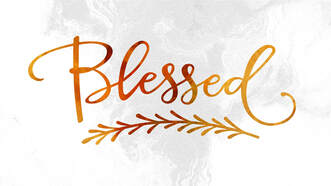
First Congregational Church of Cheshire
© the Rev. Dr. James Campbell
Luke 6:17-26
He came down with them and stood on a level place, with a great crowd of his disciples and a great multitude of people from all Judea, Jerusalem, and the coast of Tyre and Sidon. They had come to hear him and to be healed of their diseases; and those who were troubled with unclean spirits were cured. And all in the crowd were trying to touch him, for power came out from him and healed all of them.
Then he looked up at his disciples and said: “Blessed are you who are poor, for yours is the kingdom of God. “Blessed are you who are hungry now, for you will be filled. “Blessed are you who weep now, for you will laugh. “Blessed are you when people hate you, and when they exclude you, revile you, and defame you on account of the Son of Man. Rejoice in that day and leap for joy, for surely your reward is great in heaven; for that is what their ancestors did to the prophets. “But woe to you who are rich, for you have received your consolation. “Woe to you who are full now, for you will be hungry. “Woe to you who are laughing now, for you will mourn and weep. “Woe to you when all speak well of you, for that is what their ancestors did to the false prophets.
+++
This past week I said to Marcos, “Sometimes it feels like we have lived here for a long time already.” That’s another way to say that we feel at home. And the reason we feel at home is because of all of you.
Your welcome and hospitality were warm from the beginning. You swept us off our feet during that candidating weekend. We were nervous and full of hope and full of questions and doubts. That Friday night there was a cocktail reception with the leadership of the church, during which I was very careful about only having one drink. On Saturday there was the all-church reception where we first met so many of you. And on Sunday, after the candidating sermon and vote, there was yet one more reception!
At one of those receptions, a very nice couple who shall remain nameless, introduced themselves and then said: “We have two questions for you.” “OK,” I replied. “First question: How committed are you to a one-hour worship service?” And let me tell you, during a candidating weekend, how you answer that question can make all the difference! But it was their other question that came to mind this week as I prepared the sermon. They asked, “How committed are you to preaching from the lectionary?” Now if you don’t know what it is, the lectionary is a three-year cycle of biblical readings for all the Sundays of the year that give one the breadth and scope of the entire biblical message. We usually read only one passage on a Sunday, but there are actually four passages assigned to each Sunday. And I am committed to preaching from the lectionary because it forces me to confront passages I might ordinarily avoid – like this passage from Luke!
The Beatitudes of Jesus are some of his most beloved words. But when we think of the Beatitudes, we’re usually thinking of the ones recorded in the Gospel of Matthew. “Blessed are the poor in spirit. Blessed are those who hunger and thirst for righteousness,” etc. Matthew gives Jesus’s words a spiritualized gloss, making them a little easier to swallow. But Luke’s words are bitter pills that get stuck in the throat.
Luke is known for his editorial bias for the least, the last, and the lost. And Luke proclaims that a new world order is coming in which traditional patterns of power and wealth and prestige will be overturned. It’s not a message for the faint of heart.
The writer Annie Dillard, in her book Teaching a Stone to Talk, writes about atomic passages like this one. She says: “…It is madness to wear ladies’ straw hats and velvet hats to church; we should all be wearing crash helmets. Ushers should issue life preservers and signal flares; they should lash us to our pews. For the sleeping god may wake someday and take offense, or the waking god may draw us to where we can never return.”[1]
Crash helmets, life preservers, seatbelts – it sounds a little dramatic until we really read these words: “Blessed are you who are poor, for yours is the kingdom of God. “Blessed are you who are hungry now, for you will be filled. “Blessed are you who weep now, for you will laugh. “Blessed are you when people hate you… “But woe to you who are rich, for you have received your consolation. “Woe to you who are full now, for you will be hungry. “Woe to you who are laughing now, for you will mourn and weep. “Woe to you when all speak well of you, for that is what their ancestors did to the false prophets.”
Now I read that and think: where’s my crash helmet? I read that and think that Jesus might actually be talking about me. We are the richest people in the history of the world, and still we imagine that we don’t have enough. We never lack for food, in fact we could push the plate back more often. Our days are filled with friends and shopping and trips and adventures. And we think of these things as our blessings. In fact, we sometimes call them that. And we announce to the world on our t-shirts and coffee mugs and knick-knacks that WE ARE BLESSED! #BLESSED!
Now I will be the first to admit that I enjoy these things. They make me feel fortunate. And I am. But according to Jesus in the Gospel of Luke, possessions and position and power can blind us to our real need of God. For people who have everything, Jesus is often the icing on the cake. But he’s hardly the Bread of Life – that which sustains us body and soul.
So, you can see why I would have naturally avoided this passage. It’s too close to home. And it seems, at first, a blanket condemnation of the good life. But is that really what it is? To answer that question, one must remember a foundational principle of biblical interpretation. Obscure or difficult passages are always read in the light of the whole revelation of Scripture. And we know from other Gospels that some very rich folks also followed Jesus – including a group of rich women who financed much of Jesus’s ministry. So, I don’t think this passage is a call for us to divest ourselves of all our possessions. But I do think it is a call to examine our perspective on our possessions. And I think upon close examination, we might come to see that some of the things we think of as blessings are actually obstacles.
Scholars also suggest that this passage is not prescriptive: that is, it is not telling us how God ordained it all. Instead, this is a descriptive passage: it simply describes the world the way it is. It simply points out to us, in the starkest terms, the folly of our dependence upon riches. And it is a description of how the poor, out of their need, are predisposed toward God.
But this passage also gives us a remedy for what ails us – the rich of the world. And it is found in a seemingly innocuous detail about the setting. Matthew calls this event the Sermon on the Mount. When Jesus delivers his Beatitudes in Matthew, he does so from the mountaintop, looking down at the people. But in Luke, this same event is known as the Sermon on the Plain. Verse 17 says: “Jesus came down with them and stood on a level place.”
And I think that this detail is a good place to start to try to understand this difficult passage. The Kingdom of God is found on a level place. The Reign of God that Jesus proclaimed in the Gospel of Luke is a place of radical equality and community, peace and plenty - not just for the few, but for all.
In a level place, the poor of the earth meet and mingle with the rich who have the food and the power and mechanisms to relieve that hunger. And that’s how we’re most comfortable thinking about ministering to the poor – from the mountaintop of our privilege, reaching down. But in a level place, it’s a two-way street because the poor also have something that we desperately need. And I have seen, again and again, that the poor and the downtrodden and the abused and the forgotten - those folks love God in a way that we only aspire to. They love God because they know they need God. Their riches do not deceive them into thinking that they are self-sufficient. And so it is that in a level place, we both have what the other needs. The rich can feed the poor and the poor can teach the rich. And everyone is transformed. And that is the Kingdom of God come upon this earth.
This church will grow and be transformed as we are transformed. And that transformation we call salvation happens on a level place: face to face, hand to hand, heart to heart with the very folks we’ve always assumed had nothing at all to give us.
[1]Annie Dillard, Teaching a Stone to Talk: Expeditions and Encounters (New York: Harper & Row, 1982), pp. 40-41.


 RSS Feed
RSS Feed